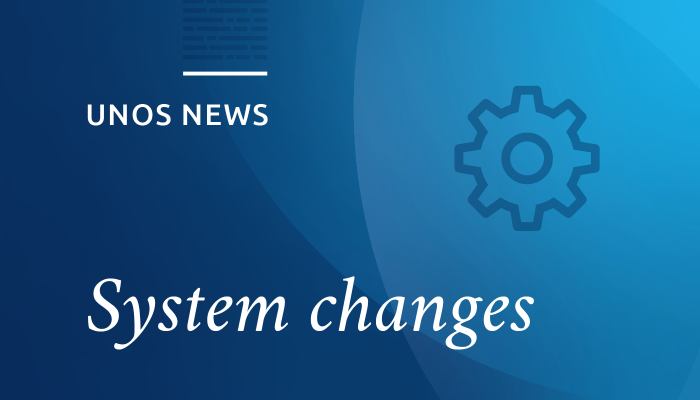Note: This is the original notice as it appeared on July 19. We have since changed the implementation date to Sept. 12, 2017 with some changes to the release. Please refer to this updated system notice for details about what has changed.
Implementation date: August 29, 2017
Audience:
- Transplant hospital staff
- OPOs
- Histocompatibility lab staff
- OPTN KPD program participants
Please share this notice with anyone in your organization who would benefit from this information.
At-a-glance:
The OPTN/UNOS Board of Directors approved the recommendation from the Histocompatibility Committee to update Policy 4.10 Reference Tables of HLA Antigen Values and Split Equivalences.
The Histocompatibility Committee must review and recommend any changes needed to the tables on or before June 1 of each year. The proposed changes to the equivalency tables are intended to reflect changes in HLA typing practice and improve organ allocation.
We are updating the HLA equivalency tables. This will result in changes to HLA and unacceptable antigen dropdown menus: either additions, conversions or deletions of existing values. These changes will occur throughout UnetSM in DonorNet®, WaitlistSM, TIEDI® and KPDSM applications. The “All Other Antibody Specificity” fields in KPD will also be affected.
It is critical that you know specifically what is being added, removed or converted so that you know what you need to do for particular patients, which in some cases may involve retesting or changing the way you report data. See below how each application will be affected.
Change details:
We are eliminating and adding HLA values and unacceptable antigens as part of this change (see this document for every addition and deletion). On September 12, we will convert the following HLA values for only active and open candidate and donor records in Waitlist, KPD, DonorNet, and TIEDI:
- A210 will change to A2
- B703 will change to B7
- B1304 will change to B13
- B7801 will change to B78
- B8201 will change to B82
- B5103 will change to B51
- DR51 positive will change to DR51
- DR52 positive will change to DR52
- DR53 positive will change to DR53
We eliminated the above values in the unacceptable antigen section of Waitlist and KPD and the other antibody specificity section in KPD. We did not convert these values, you simply won’t see them anymore.
Other changes you will see throughout UNet:
- A203 will include a preceding 0 becoming A0203
- B804 will include a preceding 0 becoming B0804
- C1 – C9 will include a preceding 0 (example: C 1 becomes C 01, C 9 becomes C 09)
- We are eliminating DQA1 04:03N as a valid unacceptable antigen, but it will remain in place as a valid HLA antigen
CPRA for kidney, pancreas and kidney-pancreas, and KPD candidates may have changed. On September 12 we will update the Waitlist and OPTN CPRA calculators to include unacceptable antigen changes. If you use your own CPRA calculator, you will need to update it to be in sync with UNet calculation.
How Waitlist Import Unacceptable Antigen Utility Will Change:
The Import Unacceptable Antigens utility will now incorporate the new unacceptable antigens for DR51, DR52, and DR53, which impacts how these will be reported.
Example:
Currently, a positive result for DR51 would be reported within an import file as follows:
- DR51
Upon implementation, a positive result is no longer a valid option, and the import will expect one of the three specific values (5*01:01, 5*02:02, 51) to be reported under the label “DR51”
- DR515*01:01, DR5151
Policy Resources:
To view the updated Antigen Equivalence tables in detail, consult: Policy 4, located on the OPTN website.
The following policy notices all contributed to these system changes:
- DQA1
- HLA Equivalency Table 2015 Updates:
- Executive Committee action: Annual Update to Equivalency Tables (2015)
- Executive Committee action: Adding DQA1
Contact:
If you have questions about these system changes, please contact the UNet Help Desk at (800) 978-4334. For general questions, particularly those related to compliance, monitoring or policy, please contact your UNOS Regional Administrator at 804-782-4800.

